
‘Poetry to me is an attempt to make music out of life and language’
Whatever else poetry may be about, it remains importantly, for me, an attempt to make music out of life and language; an attempt to imbue language and life with the brief benedictions of a higher musical order. When I say ‘music’, I do not mean merely the various structures in sound and time that music comprises of, though these too, have always been terribly important to me as a poet. My obsession with those structures underlies my early experiments with forms like the sonnet and the villanelle or with poems arranged in rhymed quatrains or tercets and poems that revolve around chorus-lines; but my view of these structures has also changed with time. What I regard today in my work, for instance, as a dubious disregard for essential mathematics, was something I saw in my twenties as a valid and deliberate attempt to disenthrall the poetic line — while maintaining a steady beat — from the mathematical tyranny of syllabic and metrical uniformity. It is not our part, as poets, to be completely comfortable with our choices: Ours but to do and die, as dear old Tennyson once said.
While one makes music out of language, one is also making music out of life; which is to say that poems begin for me by asking: ‘What is it here, within and around me, that now calls for song?’ That zone of what is within and around, has been for me, since early childhood, one pervaded and animated by multiple languages and cultural traditions. I remain, and have always been, primarily anglophone; but along with the vast heritage of anglophone literature that came my way, my years of training as a Hindustani vocalist, and my experience as a live musical performer, have — for good or ill — also played their undeniable role in giving shape to my poetic strategies and literary aesthetics. The relative functions and the sudden, mysterious interchangeability of ‘improvisation’ and ‘pre-composition’, for instance — both fundamental processes in Hindustani music — are inextricable from my view of poesis. Poetry has involved for me, over the years, a gradual emergence from the paralysis of cultural dichotomy. I wasn’t sure about this in my twenties, but today, I can see how my verse springs from a fortuitous confluence of seemingly disparate cultural histories. When I cannot believe in myself, I must still believe in the power of that confluence. It is bigger than I am and I revere it.
Dawn at Lake Pangong
Waking to grope through peak, lake and sky
For signs of some release beyond the mind’s
Power to grant, he seeks to set the eye
Adrift at dawn upon a ripple — yet finds,
As he strains his gaze to trace without a blink
Those widening curves and their shifting glint,
A lifetime of failure stalks him to the brink.
He brings to those blues the frozen black of print,
And finds the clearest waters his eyes have seen,
Cluttered by words he cannot now unsay.
No force within his grasp can now wipe clean
What spreads like ink as he shuts his eyes to pray —
The blackness of words outlived yet here to stay,
Afloat like dirt upon the lake’s blue sheen.
Brazil
When first she brought you home I must have been seven;
She who had flown in triumph half-way around you.
Now past fifty I know I have not been forgiven
For being so unlike her. The countries I have visited are few.
From the shelf where you sit Brazil stares me in the face,
Amidst wide strips of unconquered sea and land.
Surely it’s no crime to stay rooted to one place!
I have moved in ways she could never understand,
Gazing at what’s right here as at seas from an airplane –
And there’s some comfort there…though I remain
Drawn at times to that glorious curve she drew,
Traversing with a single finger one half of you;
The circle she began and left me to complete:
Wiser by far, mother, not to compete.
Threesome
So now you call long-distance to remind me
My late friend is not just mine to mourn,
But also yours —
Though things turned sour between you,
And the two of you haven’t spoken in twenty years.
I understand: you wish to reclaim a lost right to grief,
And to tell me – though, of course, you do not mention this –
That in the great list of things we have shared, you and I –
Tarkovsky, Tolkien, riverfish in mustard sauce,
Boat rides, skinny dipping, rain,
The same therapist, the same cheap rooms in gimcrack hotels –
We must not now forget to include
A dead man’s insatiable, irretrievable member.
You will want to fondle them, perhaps,
When you read this, alone in your room
On your laptop screen with the lights switched off,
The breasts I could never quite bring myself to share –
Though I tried, believe me –
With the recently dead.
Nocturne at Afghan Church*
Memorials to a war that could never be won,
Poised in silence against the dark they stand:
Spire and lamplit arch conspiring to sing
How the tongue I now speak took root in this land
Of mangoes, mangroves, lianas and incessantheat.
How sharp against the night their silence rings true —
Syllables of stone that praise a resplendent defeat,
And the triumph of a language no tongue may subdue;
Whose defiant consonants and inscrutable cadence,
Victor and vanquished alike shall never rein in –
Syllables of stone that grow in silence immense,
And presage our return to that emptiness wherein
Our efforts at speech pristinely begin;
Against the tongues we speak, we are not born to win.
*Built in Mumbai in 1848 to honour the British soldiers who died in the campaigns against Afghanistan, a territory that was never successfully annexed to the British Empire.
Joseph and Potiphar’s Wife
for Deepankar Khiwani, author of ‘Portrait of the Artist as a Middle-Aged Woman’
Solihull School, February, nineteen eighty-two.
Seen against a backdrop of wiry trees
And sheets of snow, a frozen quadrangle,
A football field frosted over, our Scripture teacher
Mrs. H., in thermal slacks and unusually high heels,
Looks more desirable than ever, as she instructs her flock
Of fidgety eleven-year-olds, just back from Christmas-break,
To depict in crayon and pencil, a scene from the life of Joseph.
Enslavement and the-coat-of-many-colours
Suggest themselves at once as obvious themes,
Amongst brief thoughts concerning bakers and grapes;
But something about my Scripture teacher’s ineffable rump
Calls to mind the tale of Joseph and Potiphar’s wife.
I put down my colour-pencils and take a deep breath,
Before slipping into my private, contorted version of the tale,
According to which the two protagonists, having made love
Many times over, finally get caught in the act,
And Mrs. Potiphar cries rape in utter defencelessness,
To save herself from being thrown to the crocodiles.
I shut my eyes and play at being either of them in turn:
Now I am Joseph—not lurching back, startled by an
Impassioned tug at his loincloth, as our Children’s Illustrated Bible
Portrays him, his palms retracted in sanctimonious refusal,
But feasting instead to the utmost upon her lips and breasts;
And now I am her, serpentine, venomous,
My breasts slipping out from the papyrus-like coils
Of the same silver gown our Children’s Bible conceals hers in,
My lips pressed firm round his startling member,
Awaiting in ecstatic ignorance some savage enigmatic thrust,
Some cryptic overflow that I imagine as I may
But as yet possess no clear knowledge of,
Bare dunes and muralled walls swinging,
Amidst pulsating hieroglyphs and slavish salivations,
Round pillars rocking, till the Nile
And all the pyramids consign themselves to darkness,
And all Egypt falls asleep to the sound of our moaning.
Outside, beyond the double-glazed windows,
Tall men in black scatter salt on ice.Here,
In Scripture-class, laid out on shelves above the coils
Of classroom heaters, as I stare, amidst premonitions
Of an unfathomable heat, at a blank notebook page,
Wet rows of tiny, fingerless gloves thaw and drip.
Vishnurata* in his Mother’s Womb
The dark was what I knew. I slept in peace;
Then woke to view a world assailed by fire.
Now streams of silken gold outshining flame
Arise to make that lethal blazing cease.
Whose lips are these that teach my tongue to say:
Lotus. Ruby. Discus. Vast white shell —
Blithe tides of orange billow and subside.
A feather falls. A flute begins to play.
*Also known as Pareekshita, son of Abhimanyu. Ashvathamma aimed a fiery magical missile of immense power at his mother’s womb to ensure the end of the Pandava clan; Krishna intervened, taking the form of Vishnu and remained with the unborn infant within the womb for several months, protecting him till the outer burning subsided.
The essay and the poems are part of our Poetry Special Issue (January 2022), curated by Shireen Quadri. © The Punch Magazine. No part of this essay or the poems exclusively featured here should be reproduced anywhere without the prior permission of The Punch Magazine.
More from The Byword
Comments
*Comments will be moderated



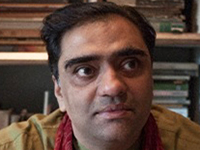

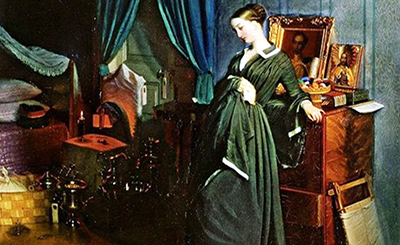
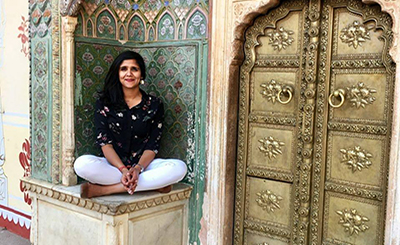
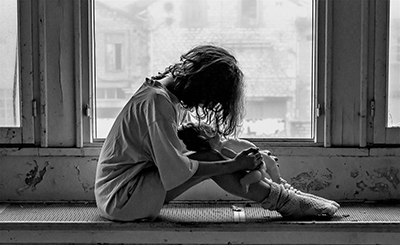


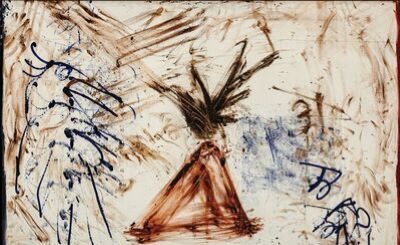
THUMBS.jpg)